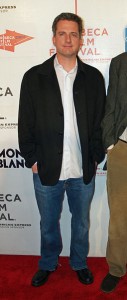Fansmanship Podcast Episode 217 – Chris Sylvester and Brint Wahlberg
It’s another podcast episode! Cal Poly basketball teams are at the Big...
There has just been too much material.
Betwen Manti Te’o and Lance Armstrong, last week was filled with an over-hyper media, once again simultaneously covering a story and covering themselves as part of a story in a sort of snake eating its own tail kind of a way. Weeks like this are the stuff legends are made of.
As consumers of sports, the last seven days have, like a political race, either opened our eyes to new and fresh ideas or further cemented our sports media allegiances.

Bill Simmons’ “malibag” columns were made for situations like Manti Te’o. By David Shankbone (Own work) via Wikimedia Commons
For some, a daily dose of Grantland.com is necessary even in a pre Te’o scandal world. Post Te’o, I would argue that there are few things more salacious or tasty to read than a Bill Simmons Manti Te’o mailbag post. Sure, the sports guy runs Grantland.com and had a podcast bigger than his ego, but the way he got to the top of that mountain was through columns like the mailbag he put out on Manti Te’o last week. This scandal was made for Simmons.
If you’re looking for someone with a strong alternative opinion, I recommend Jason Whitlock. Whitlock describes himself as “agenda free, honest, and unpredictable,” and if you like someone who tries to “stick it to “the man” on a regular basis, Whitlock is the guy to read. His twitter feed is constantly updated and his views, while extreme sometimes, are usually healthy to have in the sports ether. If you want someone who is not afraid to criticize anyone, Whitlock is your guy.
The Te’o story provided lots of targets for Whitlock’s wrath including mainstream media, ESPN, and Notre Dame. His take on Manti is one that I think lots of people didn’t know they had until they read the article, and that’s probably the biggest compliment I can give Whitlock.
More local writers, like Bill Plaschke of the LA Times, pondered a specific part of the story — namely the media’s inability to do it’s job as watchdogs. Perhaps this was a more mainstream, less intense version of Whitlock’s view, but it was a solid piece for a west-coast paper.
In the midst of Te’o “tooling out” (as C.J. Silas would put it), Lance Armstrong remained in the midst of a 15-year “tool-out.” For Armstrong, TJ Simers of the LA Times wrote a nuanced Lance Armstrong column. Simers is more the king of sarcasm and making himself a story usually, but it’s gems like the Armstrong column that keep bringing me back.
I guess, this time, it’s because I have mostly the same opinion on the matter as Simers. Does what Armstrong says now have the ability to take away all the people who found some inspiration or positive message in what he did?
I would argue that Armstrong’s consecutive Tour de France wins put more people on bikes than Tiger put on golf courses. Those people have burned millions of calories and, I would argue, are probably healthier than they were before Armstrong put the Tour de France at the top of SportsCenter. An entire industry has gone from something that was a niche sport to something more mainstream. I have ridden 3 century (100 mile) rides over the past two years and rode over 2000 miles in 2012 while losing a little weight and getting my astronomical cholesterol numbers in-check, all of which came from having a bike — and I can’t be the only one. Without Lance Armstrong’s rise I think it would have been unlikely that I would have ever gotten into cycling in the first place.
As Simers said regarding Armstrong’s confession:
… But what difference does it make today to those who found hope so long ago in his own cancer story?
His story was alive and brimming with inspiration when those afflicted at the time needed it the most.
How many took what Armstrong had to say as the gospel, finding common resolve in their own yellow wristband, only now to have to watch Oprah?
I have no interest in watching. Who cares what Armstrong has to say now? Who cares how this story plays out, with his athletic career over and his influence now old news?
Like so many other athletes and celebrities, he had the ability to uplift, did so for a time, but ultimately wasn’t up to the task.
None of it changes the power of inspiration and what it means to some — even if under false pretenses.
Would you lie to someone dying if you thought it would bring them some peace?

Where someone gets their news and opinion says something about their fansmanship. By Cortega9 (Own work), via Wikimedia Commons
Point made. I wasn’t dying, but I did use Lance as an inspiration at some level and that’s not something that even his confession can take away from me — and I’m not ashamed of it either.
So what website did you visit last Wednesday when the Te’o story broke? Even though the Te’o story was only related to sports and the Armstrong story potentially outdated in its relevance, we can learn something about our fansmanship by thinking about where we look for our information about sports and about which outlet has the information in its most relevant and useful form.
While the LA Times and Grantland are staples for me already, I think I’ll be reading a little more Whitlock and a little less ESPN.com this week (and yes, I know ESPN owns Grantland…). Whatever I’m reading about though, I just hope it has a little more to do with what’s happening on the field than off it.
It’s another podcast episode! Cal Poly basketball teams are at the Big...
One of my favorite authors, Jeff Pearlman joins this edition of the...
Donovan Fields is one of the most joyous basketball players I’ve ever...
With the tournament more than underway and the sweet sixteen fast approaching,...
(Article by Luke “Loco” Johnson. Forgive website faux pas.) The genius of...
* Team Records accurate as of Friday morning, 8:39 A.M. The hyped hoopla...
